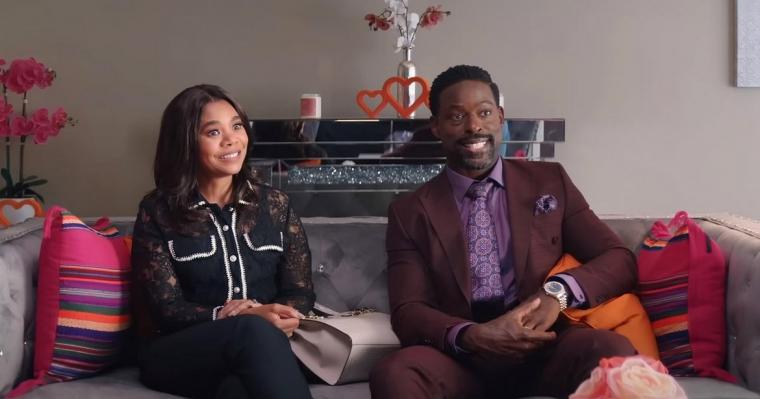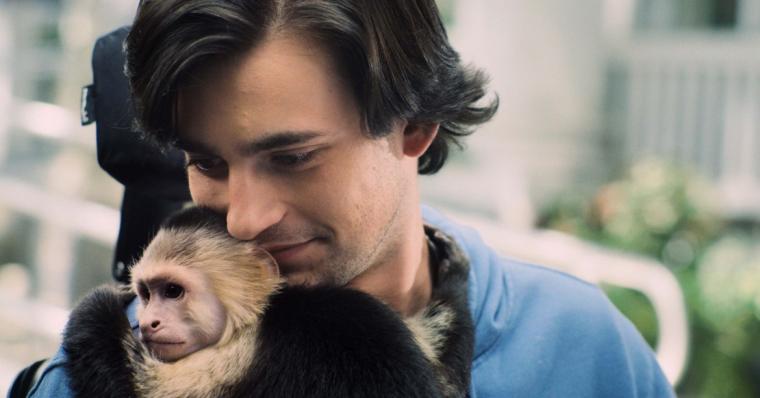
Regina Hall and Sterling K. Brown in Honk for Jesus. Save Your Soul.
HONK FOR JESUS. SAVE YOUR SOUL.
Among inherently American targets, few seem more ripe for merciless satire than the cult of big-money, mega-church evangelism; it's frankly astonishing that Christopher Guest and Eugene Levy didn't get around to the subject back in their Waiting for Guffman/Best in Show/Mighty Wind heyday. Yet while writer/director Adamma Ebo similarly employs that duo's mockumentary format for Honk for Jesus. Save Your Soul., the fascination of the movie lies in it not being used – not strictly used – for the purposes of comedy. There are laughs, to be sure, and big ones; nothing else in 2022 has made me gut-cackle quite the way I did when a wronged wife, here, submerged her adulterous husband in a baptism pool for just a li-i-i-ittle longer than obviously planned. The film's overriding tones, however, are of sadness, regret, and pathetic neediness, and as hilarious as Regina Hall, Sterling K. Brown, and their co-stars frequently are, you're left as likely to well up from pity as from laughter. This is a truly rare bird: a mockumentary drama. With loads of cringey giggles.
Brown and Hall play Pastor Lee-Curtis Childs and his “First Lady” Trinitie, who lorded over an intensely popular, and profitable, Southern Baptist church. But with – surprise! – a massive sex scandal all but demolishing their congregation, the good pastor decides to invite a documentary film crew to view and record their comeback attempt: a grand reopening of their glistening cathedral on Easter Sunday, even though most former parishioners will almost certainly be attending the service held by the Childs' younger rivals and, pointedly, married co-pastors (the biting, hysterical Nicole Beharie and Conphidance). You probably don't need me to tell you where this plan goes: south. Venality, desperation, and comic humiliations are all but baked directly into the mix, along with the promise of a schadenfreude-rific great time watching these “servant of God” hucksters finally get what's rightfully theirs.
For much of Ebo's movie – an expansion of her previous short film – that's precisely what we're given. While the laughs are largely easy ones, there's no denying the fun to be had as we witness the Childs' unconscious awfulness: entering their voluminous, color-coded and Pravda-heavy closet and listening to Lee-Curtis' argument for buying yet another designer outfit for the Easter service; hearing the meaningless platitudes of the five parishioners who support the couple with backward reasoning; watching the smiling-through-loathing shopping-mall encounter between Trinitie and a former ally (a dryly acidic Olivia D. Dawson) who starts their conversation with a teeth-clenched “Bless your heart.” (As the recent Vengeance informed the unaware, that's code for “Go f--- yourself.”) Ebo scores knowing chuckles with seemingly everything from devout church ladies' fondness for hats in the $2,000 range to Lee-Curtis' absurdly ripped musculature, and the movie-within-the-movie's doc crew nabs fabulous bits of marital hostility amidst the for-the-cameras allegiance. I particularly relished the Childs' passive-aggressive spat over whether the Baptist Internet prefers it to be pronounced “Ay-men” or “Ah-men.” That Lee-Curtis and Trinitie are in eventual agreement doesn't mean they're in unison.

But that's merely Honk for Jesus.' faux-doc angle, which is offered via a moderately boxy presentational ratio that would fit on most 20th-century TV screens. The other significant portion of the film is more wide-screen, and represents what's happening with the Childs when the doc camera is turned off … usually. In these bits, we see how the married evangelists prepare for and handle the intrusion of cameras on their daily lives, and see the fissures of their marriage as it begins, inevitably, to disintegrate. I wish I could say that this vacillation between styles – kind of like what happened at the end of the series finale to HBO's brilliant Lisa Kudrow comedy The Comeback – was completely successful. It isn't, primarily because Ebo, in several instances, employs both styles at once, and doesn't make clear what the filmmakers hear and what they don't. (Shouldn't everything recorded by the doc team be in the same boxy format?) Yet it still gives us essential insight into the truth behind the “truth” of what we're seeing, and provides the leads with ample opportunities to play their material for pathos as well as humor.
Despite his third-season arc on The Marvelous Mrs. Maisel, Sterling K. Brown – one of our supreme modern sufferers, at least on television – isn't necessarily a performer you'd associate with a million laughs. But he appears to be aiming for a million or more in his flashy, quick-witted, jubilantly loquacious take on Pastor Childs, preening about in his Skittles-colored suits and making enticing arguments for the original Rocky just being a prelude to the Rocky movies that really counted. But you don't hire Brown for your project unless you also want to make use of his astounding empathy and gravity, and the actor nails his scenes of barely hidden shame, guilt, and deflection. He's pathetic, even loathsome, and somehow your heart still goes out to him.
Still, at all times, this is Regina Hall's movie. So many movies are Regina Hall's movies. I'm not sure if any other film star has given so many Oscar-worthy performances in movies that are most assuredly not Oscar-friendly. But I'd have readily awarded the recent Academy Awards co-host a statuette for 2017's Girls Trip, and 2018's Support the Girls … and this might be the purest distillation yet of Hall's protean talent for blending comedy and drama with beguiling impeccability.
As usual, the surface details are just right, and Hall's Trinitie is effectively surface in the doc scenes – all smiles and encouragement and public apologia. Also as usual, Hall demands that we look closer. At the pain in Trinitie's eyes as her wayward husband preens about how Satan lured him into indiscretions she knows in her heart were his own. At her damaged bearing as she suffers a verbal, f-bomb-laden assault by a former parishioner holding a toddler. (Trinitie finally has no choice but to deliver an f-bomb-laden retort, also in front of said toddler.) At her silent mortification as Trinitie dutifully enacts a street-mime promo that her bastard husband has coerced her to perform in literal white-face. Honk for Jesus. Save Your Soul. has a lot to say about modern-day evangelism and televangelism. The talk is terrific; the gags are great; the staging is solid. But the movie really didn't have to work so hard. Thirty seconds of Regina Hall's incandescent expressions, at almost any point, give us the whole story and then some.

GIGI & NATE
Over the years, I've seen plenty of movies about men and their monkeys: Tarzan flicks; Ronald Reagan's notorious Bedtime for Bonzo; Clint Eastwood's Clyde comedies Every Which Way But Loose and Any Which Way You Can; Matt LeBlanc's baseball-playing-chimp extravaganza Ed. (Okay, I never saw the critically reviled Ed, because I adore LeBlanc and life is just too short.) Regardless of their quality or lack thereof, I can't say I had complicated feelings about any of them. Gigi & Nate, however, I have complicated feelings about.
If you've seen the trailer, you might think you know what to expect from this predictably fact-based tale of a how a depressed young quadriplegic found renewed purpose through the arrival of his Capuchin service animal. Sentimental uplift. Life lessons learned. More “Aw-w-w-w!”-inducing shots of the monkey's adorably expressive mug than you can shake a banana at. Check, check, and check. But as delightful/noxious as that may sound, what actually transpires is both considerably stronger and a lot more frustrating than what this premise would seem to promise.
To its credit, there's a considerable amount of “considerably better” in this mostly lighthearted drama by director Nick Hamm and screenwriter David Hudgins, starting with its male lead. As the recent high-school graduate Nate Sullivan who contracts meningitis after a disastrously unwise high dive into a lake, Charlie Rowe is sensational, the 26-year-old British actor believable as a teen, an early-20-something with quadriplegia, and a Tennessee native. Rowe has a beautiful face and blessedly spiky wit, and he's fiercely convincing as someone who would rather die than be separated by his primate. But even when they're stuck in thankless roles, Hamm's entire cast is dynamite, with Marcia Gay Harden determined and moving as Nate's mom, Jim Belushi admirably restrained as his dad, the outstanding Josephine Langford as his oldest sis, and Zoe Margaret Colletti (who recently played Steve Martin's surrogate daughter Lucy in Only Murders in the Building) as his quasi-girlfriend. Even Diane Ladd, looking luminous at 86, shows up as Nate's day-drinking grandma, and it's a pleasure to see her even if she's really only employed for her occasionally quivering lip and slightly sorry comic relief. Amazingly, though, this thing might still have worked – well, parts of it might have worked – with less-impressive performers.

In a major surprise, this work that threatened to be unbearably treacly doesn't shy away from the massive controversy regarding the usage of wild animals for human service (or, if you'd rather, enslavement). Instead of tossing the issue off, Hudgins' script dives head-first into the debate – it accounts for at least a third of the movie's 105-minute running length – and muddies the morality further by making Nate himself the source of the controversy, with the young man bringing his Capuchin to a wild sorority party and finding the whole affair eventually captured on Instagram. And as you might expect, Gigi & Nate's leading lady is really something. Roll your eyes if you must, but if you don't instantly choke up at the sight of that little bugger comforting her lonely boss by cuddling herself around his neck like a scarf, we can no longer be friends. Not even Facebook friends.
But dammit, aside from the contributions of a few unsinkable cast members (I'm lookin' at you, Marcia), Hamm's outing still manages to frequently, annoyingly negate nearly every compliment you give it. The Capuchin Gigi is phenomenal until she's “portrayed” by a totally unconvincing CGI replicant – the one who blinks like a Stepford wife and leads a grisly slapstick chase through the kitchen while the Sullivans' (also CGI?) pooch chases after her and trashes the place. Hudgins' animal-rights subplot is incredibly appreciated until we realize that the protestors are going to be conceived as grotesque, vandalizing cartoons, all of them eminently hissable and some of them donning full-body monkey suits to underscore their rage. (Hats off to the divinely human-scaled Welker White – Ray Liotta's babysitter in GoodFellas and Al Pacino's wife in The Irishman – for not making her protest leader a stereotypical, pinch-faced monster.) The Sullivan family's plight is wholly empathetic, and even relatable, until you comprehend just how many millions this family must have banked to care for Nate in a manner likely impossible for 99 percent of the population. The finale is inspirational and motivational until you realize that its ultimate message is “If you can't beat 'em, move.”
To be clear, I didn't not enjoy Gigi & Nate. (How's that for clarity?) I dug the actors and relative polish and got misty-eyed a few times; I'm not an ogre. But the movie was so close to really good that I left bummed that it wasn't better. And in truth, this perhaps wasn't the ideal time for a release in which the chief villain argues that it might not be wise to place a wild animal in a daily human environment – even an unconditionally welcoming one. In the first minutes here, we're given a shot of Gigi's perspective from beneath semi-translucent fabric. I remember witnessing a similar image in Jordan Peele's Nope. More importantly, I remember what happened next.








